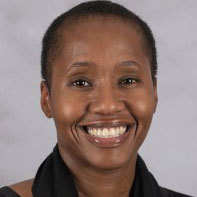
As a student, Yolanda Rolle was surrounded by good teachers and had a positive experience in school; in fact, she “always felt like [she] would find [herself] teaching” someday. In 10th grade, she even approached her history teacher with a request to tutor struggling students.
“That was just the natural thing for me to do,” Rolle said. “I didn’t know how to not do that . . . everywhere I went, I looked to teach or tutor.”
Teaching, she explained, felt inevitable: “I was just behaving like a teacher, not because I sought out to be a teacher . . . I don’t think I had much of a choice.”
In college, Rolle studied electrical engineering and math. Oftentimes, she was the only girl and Black student in her class.
“That threw me for loops because I grew up in the Bahamas where most of my teachers and peers looked like me,” she recalled. “So when I came to the United States, that was a large culture shock that made me question, ‘Do I belong here?’”
She clarified that it didn’t mean she was intellectually out of place, however, and her hard work always put her at the top of her class.
One unique quality Rolle brings to the classroom is her unhurried approach to teaching, shaped by the slower pace of her Bahamian upbringing. Now, in a country where speed is highly valued, she has noticed that her style may be viewed as aloofness or unresponsiveness. This may lead to the assumption that she’s not quick enough to grasp complex ideas.
However, Rolle insists that her pacing is key to her teaching philosophy. “If you come into my class, it’s slow as heck,” she said. “But it’s an intentional slow . . . I think that to really understand math, you need a moment. You need to take a beat.”
Rolle also defines success very differently than much of corporate America. To her, a successful day means having the space to be present and “take a moment to just be.”
She added, “A successful day can slow down in a way where I can enjoy the math I’m teaching, hard or easy, enjoy the interactions I have with students, get along with my colleagues and just see people. How I am with people matters to me. How I care for people matters to me. How kind I am for myself matters to me.”
She always asks herself, “Was I kind?” and reflects on her interactions with her fellow faculty members and students. She emphasized that she strives to appreciate the goodness around her and to be mindful of what she is grateful for.
Rolle brings this mindset into the classroom and likes to share it with her students. She will often randomly ask a student in the middle of a lesson, “What made you smile today?” This simple question can lead students to reflect on their day and think positively about the experiences around them.
Ultimately, Rolle hopes to leave behind a legacy defined by love and support.
“I want my students to know that I don’t see them as a grade,” she said. “I want them to know that I see them as a human being and that I love them . . . with the kind of love that will let that person know I respect them.”
Through her teaching, she aims to give her students an experience where they don’t tie their worth to a grade; they’re so much more than that. She wants them to be excited about new mathematical concepts, free from the fear of failure.
“I don’t want someone to walk away from my class with a bad grade and think they’re bad,” she added. “I think high school students are just way too young to walk away from a math experience and say that they are bad at it. I want all my students to be open to math.”
Reflecting on her journey, Rolle shared a piece of advice she would share to her younger self: “When one door closes, a window opens.” She believes that opportunities are everywhere, and getting hung up on a broken heart is not worth it.
Her philosophy is one of love and appreciation; students should feel comfortable and realize there is more to life than school and grades. Above all, she stressed that she wants to love and for that love to be felt.










































